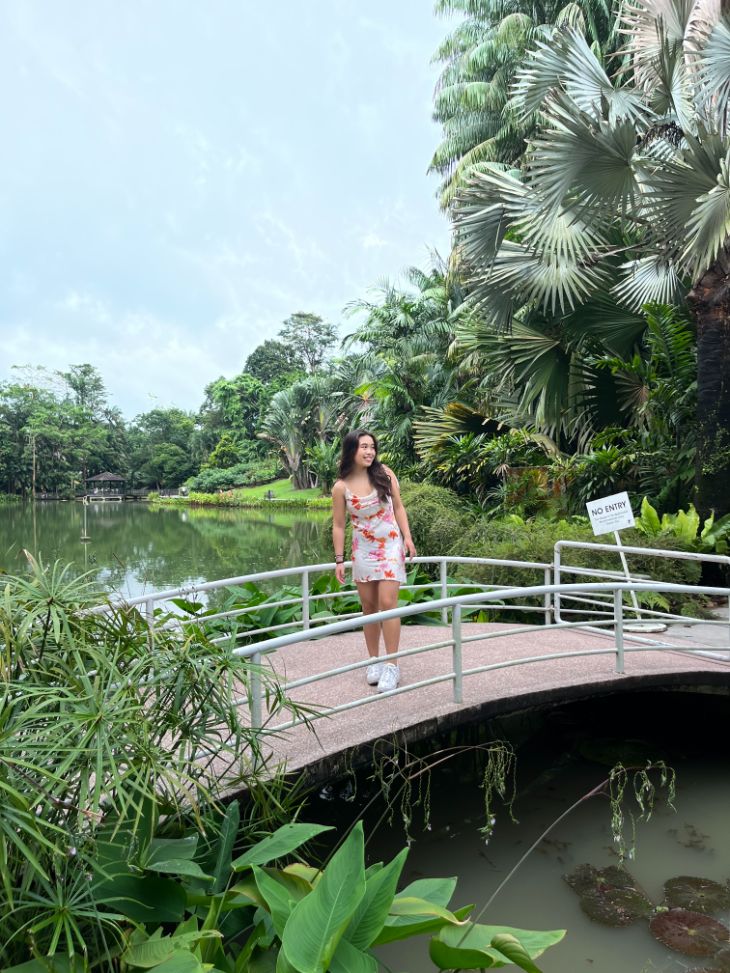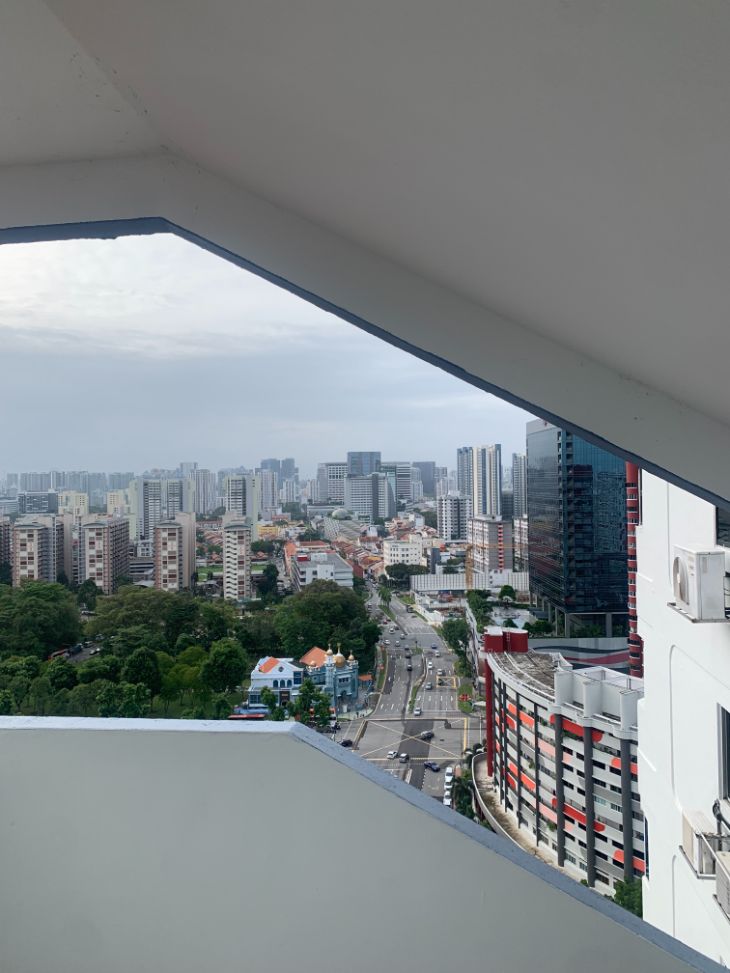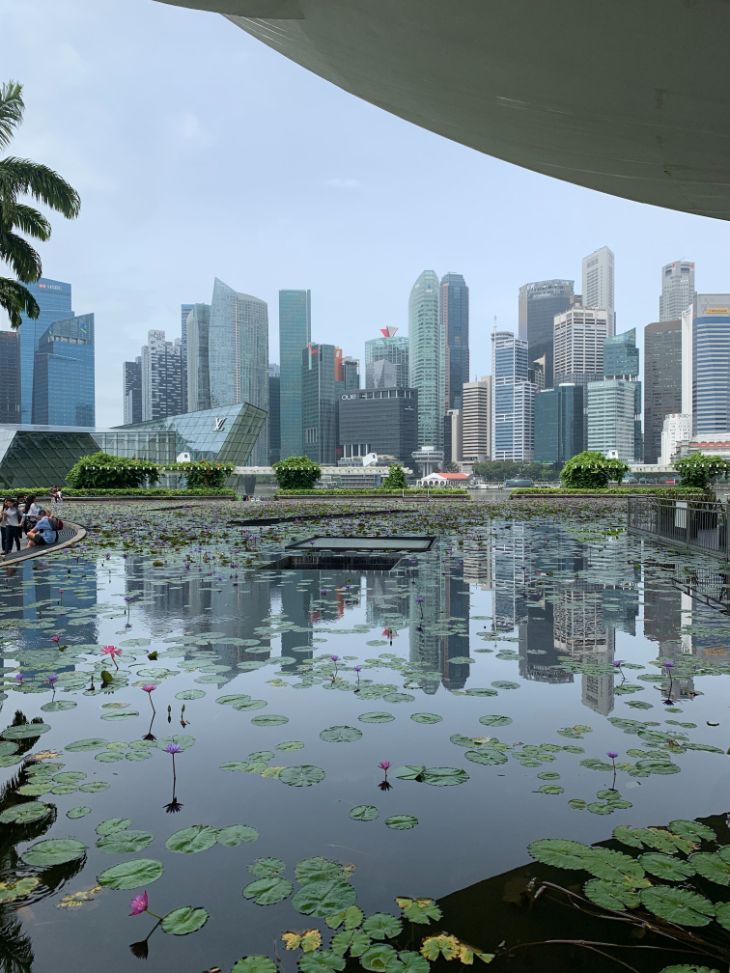Gugma Vidal
About My Study Abroad Program
Major/Minor: Major: Public Policy, Minor: Creative Writing
Program: National University of Singapore
Location: Singapore, Singapore
Email: gvidal@unc.edu
Term: Spring 2023
Why did you choose to study abroad and how did you select your program?
I chose to study abroad because I wanted to push myself to become more independent and learn more about the world than just my bubble in North Carolina. I wanted to challenge myself to think for myself and find my own roots in a place that was unfamiliar. I did not expect to study abroad during my undergraduate years, having dismissed the idea before as something I would do after graduating. However, the excitement of discovering myself outside of my comfort zone convinced me to be bold and study abroad my sophomore year. It certainly was not part of my 4-year plan initially, but it was a choice I am grateful to myself for making.
I chose my program at the National University of Singapore (NUS) because of my Southeast Asian roots and my personal ties to Singapore. My father studied at the same university, and I lived in Singapore for two years when I was young. I knew I wanted to get into research in university just like my father had, and NUS had impressive research facilities and a reputation for being a leader in research. I was able to do research under the Saw Swee Hock School of Public Health, making both myself and my father proud. I also had a personal goal to become closer with my identity as a Southeast Asian, and choosing to study in Singapore was a good opportunity for me to travel throughout Southeast Asia and learn more about the different cultures of the region.
What did you learn about yourself?
Studying abroad helped me gain confidence in my abilities to find my own way and problem-solve. I learned that I am observant and resourceful, and I can figure things out without relying heavily on others. Understanding my environment and how things worked around me was important to me, because I wanted to be self-reliant and decide for myself how my study abroad experience would go. During my program, I discovered a confidence in myself to talk to new people; not only was I good at it, I also found it incredibly fulfilling. I learned a lot from talking to people of diverse backgrounds; Grab drivers who took me to the airport, my Malaysian research supervisor, and my Singaporean classmates. I asked questions and was better informed for making the most of my experience in Singapore. Studying in a foreign country revealed my true self, someone who is inquisitive and able to navigate unfamiliar situations independently.
What is one of your favorite memories from your program?
One of my favorite memories was spending a night in Singapore together with three of my sorority sisters from UNC and our other friend in the Asian Greek community. We all had come to Singapore on separate paths, but it was a special night for our paths to cross and let us spend time together. We walked around the Bugis area, which is a lively enclave of Arab influence, and tried a popular ice cream place, Birds of Paradise where I tasted the best ice cream I have ever had. We rushed to take the subway to Gardens by the Bay, where we hoped to watch the spectacular tree light show. We got lost a few times, but I ran across the bridges and winding paths to get to the viewing deck because I didn't want to miss the show. The booming music and the starry light show were unforgettable, and it was one of those experiences that remain deeply entrenched in your memory. Years from now, I know I'll ask some of my friends about that night, and we'll relive that happy moment in time together, in Singapore.
What advice do you have for future study abroad students?
I have a few pieces of advice for future study abroad students who may face uncertainties, like I did.
1. The most difficult part of pursuing things that will help you grow is the wind-up. Once you get past the initial climb and start to get your bearing, the rest becomes infinitely easier. I struggled with taking the leap of faith, but a motivated, 'just do it' mindset helped me get out of my head and try new things.
2. It's okay to do things alone, and it can often be more rewarding. Figuring out how to do things by myself gave me greater confidence and allowed me to pursue what I wanted at my own pace. I went to many places on my own without having to wait on other people's timelines. Don't be afraid of doing things alone, because you can grow much more through solo experiences.
How do you identify?
Student of color, Heritage Seeker
Could you share any experiences where your identity played a role in your time abroad?
Studying in Singapore as an ethnically Southeast Asian Filipino who was also a foreign American student sometimes affected how I could interact with my peers in class. I was excited to study in Southeast Asia because I thought I would fit in easily due to my identity. I took a few cultural classes in Southeast Asian studies and while I was able to relate to some cultural elements, there was a lot more I could not relate to. Surrounded by peers who had lived in Southeast Asia all of their lives, I often didn't feel knowledgeable enough about my own heritage to contribute to the conversations. This left me feeling isolated and there were times where I felt a strong sense of imposter's syndrome, being somewhere I was not qualified to be.
Is there any advice you would give to other students who share your identity?
Feeling out of place because of your identity, even if you may look like you belong, can be tough. However, with the right mindset you can adapt and make the most of the experience. My discomfort pushed me to become more exploratory in my heritage on my own, choosing project topics about Filipino culture to learn independently. Additionally, being different from your peers can actually be beneficial. Although your peers may not understand the complexity of your identity as someone who may look like them, but not speak the same way or have the same upbringing, you can share your diverse perspective and tell them about your unique experiences. When I exchanged stories and perspectives with my peers, they were fascinated by our differences and interested in what I had to say.
If you faced any challenges abroad, where could you turn to get the support you needed?
When I faced identity challenges abroad, I sought comfort in my fellow exchange peers who were having similar thoughts and feelings as I was. Having the support of people going through the same experience was really important for me, because I could talk about my emotions with other Southeast Asian Americans who could empathize.
Memories





